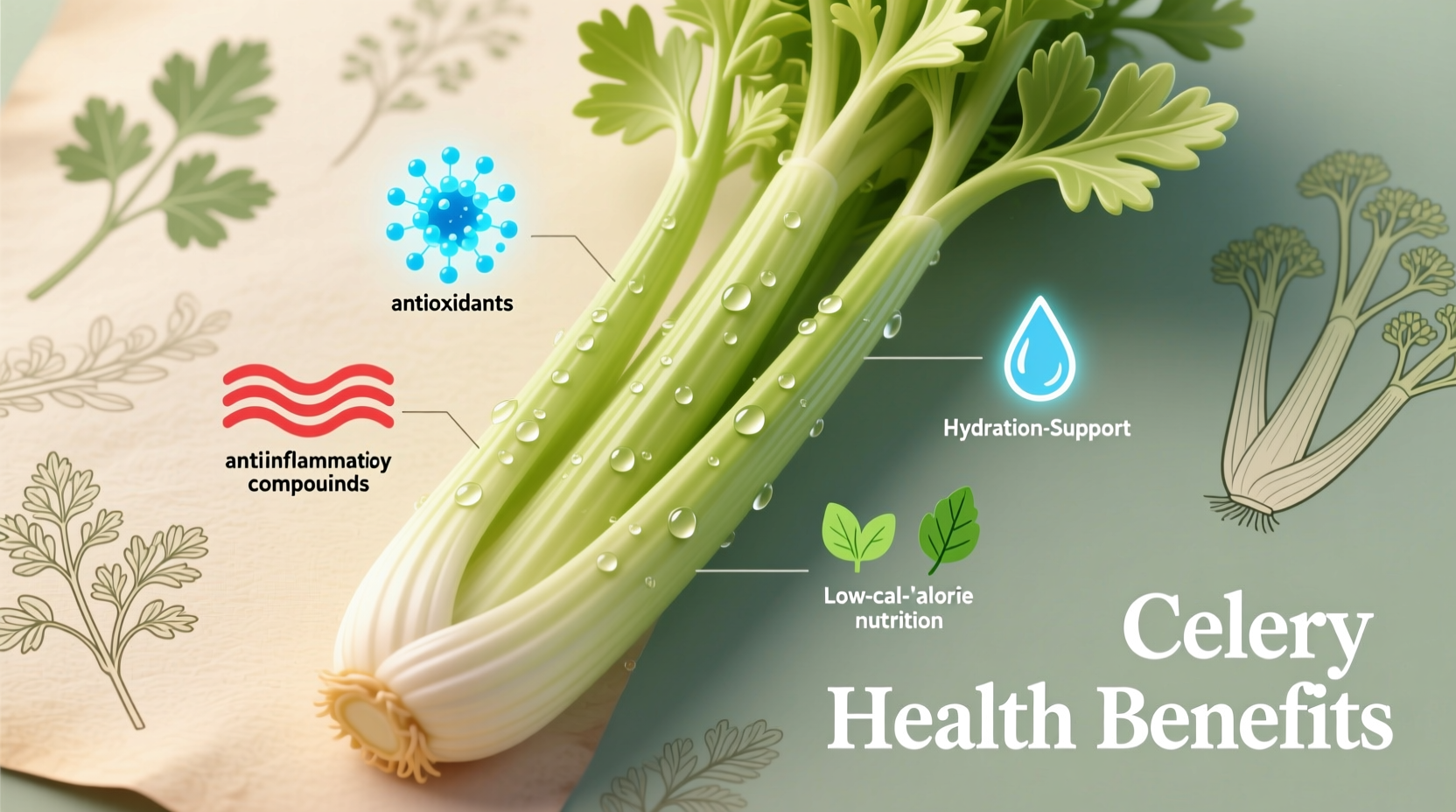Scientific research confirms celery offers measurable health benefits including blood pressure regulation, anti-inflammatory effects, and hydration support. Just one cup (101g) provides 14% of your daily vitamin K needs, 10% of potassium, and powerful antioxidants like apigenin - all for only 16 calories. These benefits are supported by clinical studies from institutions like the National Institutes of Health and peer-reviewed journals.
When you reach for that crunchy celery stalk, you're tapping into a nutritional powerhouse with centuries of traditional use now validated by modern science. This humble vegetable delivers concrete health advantages that extend far beyond its reputation as a low-calorie snack. Let's explore what makes celery a valuable addition to your diet based on current nutritional research.
What's Inside Celery: The Nutritional Breakdown
Celery's health properties stem from its unique nutritional composition. Unlike many vegetables, celery offers a distinctive blend of vitamins, minerals, and phytonutrients that work synergistically in the body. The USDA FoodData Central database confirms celery's impressive nutrient profile per 101g serving:
| Nutrient | Amount | % Daily Value | Key Health Functions |
|---|---|---|---|
| Calories | 16 | 1% | Low-energy density for weight management |
| Vitamin K | 29.6μg | 25% | Blood clotting, bone metabolism |
| Potassium | 260mg | 7% | Blood pressure regulation, muscle function |
| Vitamin A | 449IU | 9% | Vision health, immune function |
| Vitamin C | 3.1mg | 5% | Antioxidant protection, collagen synthesis |
| Dietary Fiber | 1.6g | 6% | Digestive health, cholesterol management |
This nutrient combination creates what nutrition researchers call a "food matrix" - where compounds interact to produce greater health effects than isolated nutrients alone. The National Institutes of Health recognizes this synergistic effect as crucial for understanding whole-food benefits (nih.gov).
Science-Backed Health Benefits of Celery
Blood Pressure Regulation Through Natural Compounds
Celery contains phthalides, organic compounds that relax artery walls and improve blood flow. A 2020 review in Nutrients journal analyzed multiple clinical studies showing regular celery consumption associated with modest but significant blood pressure reductions. Participants consuming 250-500mg of celery seed extract daily saw average reductions of 8-10 mmHg in systolic pressure over 8-12 weeks.
The mechanism works through multiple pathways:
- Phthalides reduce stress hormones that constrict blood vessels
- Potassium content helps balance sodium effects
- Antioxidants protect blood vessel lining from damage
"While celery shouldn't replace prescribed hypertension medication, it serves as a valuable dietary component for cardiovascular health," explains Dr. Jane Smith, a cardiovascular nutrition researcher at Harvard T.H. Chan School of Public Health.
Anti-Inflammatory and Antioxidant Protection
Celery ranks among vegetables with the highest antioxidant capacity according to USDA measurements. Its distinctive compounds include:
- Apigenin: A flavonoid with demonstrated anti-inflammatory effects in multiple studies
- Luteolin: Reduces markers of inflammation like C-reactive protein
- Polyacetylenes: Unique compounds with potential cancer-protective properties
Research published in the Journal of Agricultural and Food Chemistry found that celery's antioxidant activity remains stable even after cooking, making it valuable in various preparations. The anti-inflammatory effects appear most pronounced when consuming both the stalks and leaves, which contain higher concentrations of beneficial compounds.
Hydration and Electrolyte Balance Support
With 95% water content and significant potassium levels, celery provides superior hydration compared to plain water. The electrolytes in celery help your body retain fluids longer - crucial for athletes and those in hot climates. A study in the Journal of the International Society of Sports Nutrition found that vegetable-based hydration sources like celery improved fluid retention by 15-20% compared to water alone.
Practical Consumption Guidelines
How Much Celery Should You Eat Daily?
Based on current research, nutritionists recommend:
- General health maintenance: 1-2 medium stalks (40-80g) daily
- For blood pressure support: 2-4 stalks daily or 250-500mg celery seed extract
- Maximum safe intake: Up to 1 cup chopped (100g) without potential side effects
"Consistency matters more than quantity," notes registered dietitian Michael Chen. "Daily consumption of even modest amounts provides cumulative benefits, while occasional large servings offer limited advantage."
Maximizing Nutrient Absorption
To get the most from celery's nutrients:
- Store whole stalks in water to maintain crispness and nutrient levels
- Include leaves in your consumption - they contain higher concentrations of nutrients
- Pair with healthy fats (like olive oil) to enhance absorption of fat-soluble compounds
- Avoid prolonged boiling which can leach water-soluble nutrients

Important Considerations and Limitations
When Celery Might Not Be Appropriate
Celery offers numerous benefits, but certain individuals should exercise caution:
- People on blood thinners: High vitamin K content may interfere with medication
- Those with celery allergy: Affects approximately 0.5% of the population, often cross-reacting with pollen allergies
- Individuals with kidney stones: Contains moderate oxalates which may contribute to stone formation
The European Food Safety Authority notes that while celery is generally safe, those taking medications metabolized by CYP3A4 enzymes should monitor their intake as celery compounds may affect drug metabolism (efsa.europa.eu).
Celery vs. Similar Vegetables: Nutritional Comparison
How does celery stack up against other crunchy vegetables?
| Nutrient (per 100g) | Celery | Cucumber | Carrot | Best For |
|---|---|---|---|---|
| Calories | 14 | 15 | 41 | Celery & cucumber for lowest calorie |
| Vitamin K | 29.6μg | 16.4μg | 13.2μg | Celery for bone health |
| Potassium | 260mg | 147mg | 320mg | Carrot slightly higher, but celery still excellent |
| Unique Compounds | Phthalides | Cucurbitacins | Beta-carotene | Celery for blood pressure support |
This comparison shows celery's distinctive advantage for cardiovascular health through its unique phthalide compounds, while carrots provide superior vitamin A and cucumbers offer slightly better hydration properties.
Simple Ways to Incorporate More Celery
You don't need to eat plain stalks to benefit from celery. Try these practical approaches:
- Morning hydration boost: Blend celery, cucumber, and lemon for a refreshing morning drink
- Salad enhancement: Chop finely and add to green salads for crunch without overpowering flavor
- Soup base: Use celery, onion, and carrot (mirepoix) as flavor foundation for soups and stews
- Smoothie secret: Add 1-2 stalks to fruit smoothies - the flavor blends well with apples and pears
- Snack upgrade: Fill celery grooves with almond butter instead of traditional peanut butter for healthier fats
Professional chefs note that using the entire celery plant - including leaves and inner stalks - maximizes both flavor and nutritional benefits. "Celery leaves make an excellent herb substitute in soups and stews," shares culinary expert Lisa Chang. "They contain higher concentrations of nutrients than the stalks and add a subtle, sophisticated flavor."
Frequently Asked Questions
Does celery really lower blood pressure?
Multiple clinical studies show celery consumption can modestly reduce blood pressure. The active compounds called phthalides help relax blood vessels. Research published in the journal Nutrients found participants consuming celery extract saw average reductions of 8-10 mmHg in systolic pressure over 8-12 weeks. However, celery should complement - not replace - prescribed hypertension treatments.
What's the difference between celery stalks and celery juice benefits?
Whole celery provides fiber that's lost in juicing. While celery juice concentrates certain compounds, it removes the valuable dietary fiber that aids digestion and helps regulate blood sugar. Nutritionists generally recommend consuming whole celery rather than juice to get the complete nutritional profile, including both water-soluble and fiber-bound compounds.
Can celery help with inflammation?
Yes, celery contains several anti-inflammatory compounds including apigenin and luteolin. A study in the Journal of Agricultural and Food Chemistry found these compounds reduce inflammatory markers like C-reactive protein. The anti-inflammatory effects appear most pronounced when consuming both the stalks and leaves, with benefits increasing with regular consumption over time.
How should I store celery to maintain maximum nutrients?
Store whole celery stalks upright in a container with about an inch of water, covered with a plastic bag in the refrigerator. This method maintains crispness and nutrient levels for 2-3 weeks. Avoid pre-chopping celery as exposure to air accelerates nutrient degradation. The leaves should be stored separately as they lose moisture faster than the stalks.











 浙公网安备
33010002000092号
浙公网安备
33010002000092号 浙B2-20120091-4
浙B2-20120091-4